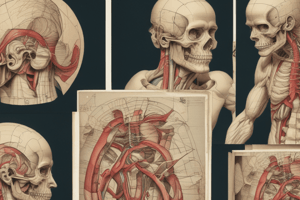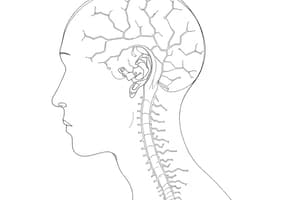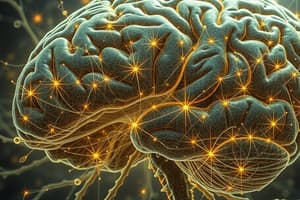Podcast
Questions and Answers
Which statement is true regarding upper motor neurones for the facial nerve (CN VII)?
Which statement is true regarding upper motor neurones for the facial nerve (CN VII)?
- They provide contralateral innervation to the lower quadrant of the face. (correct)
- They have bilateral innervation for all facial muscles.
- They only affect the muscles in the upper quadrant of the face.
- They originate from the brainstem.
Upper motor neurones for the hypoglossal (CN XII) nerve provide bilateral innervation.
Upper motor neurones for the hypoglossal (CN XII) nerve provide bilateral innervation.
False (B)
Where do the corticobulbar fibres synapse with lower motor neurones?
Where do the corticobulbar fibres synapse with lower motor neurones?
Motor nuclei of the cranial nerves
The upper motor neurones from the left primary motor cortex act as upper motor neurones for the _____ and _____ trochlear nerves.
The upper motor neurones from the left primary motor cortex act as upper motor neurones for the _____ and _____ trochlear nerves.
Match the cranial nerve with its innervation type:
Match the cranial nerve with its innervation type:
What is the primary function of the pyramidal tracts?
What is the primary function of the pyramidal tracts?
The corticobulbar tracts supply the musculature of the body.
The corticobulbar tracts supply the musculature of the body.
From which part of the brain do the corticospinal tracts originate?
From which part of the brain do the corticospinal tracts originate?
The fibers in the lateral corticospinal tract _______ (cross over to the other side of the CNS).
The fibers in the lateral corticospinal tract _______ (cross over to the other side of the CNS).
Where do the lower motor neurones from the ventral horn supply muscles?
Where do the lower motor neurones from the ventral horn supply muscles?
Match the following areas of the brain with their related function:
Match the following areas of the brain with their related function:
The anterior corticospinal tract decussates in the medulla.
The anterior corticospinal tract decussates in the medulla.
What condition is associated with compression of the internal capsule?
What condition is associated with compression of the internal capsule?
Flashcards are hidden until you start studying
Study Notes
Pyramidal Tracts Overview
- Named after the medullary pyramids in the medulla oblongata.
- Responsible for voluntary control of body and facial musculature.
Functional Subdivisions
- Corticospinal Tracts: Supply musculature of the body.
- Corticobulbar Tracts: Supply musculature of the head and neck.
Corticospinal Tracts
- Originate from the cerebral cortex, incorporating:
- Primary motor cortex
- Premotor cortex
- Supplementary motor area
- Receive input from the somatosensory area, influencing ascending tract activity.
- Neurons converge and descend through the internal capsule, a white matter pathway between thalamus and basal ganglia.
- Internal capsule is vulnerable to compression, leading to potential 'capsular stroke' and lesions of descending tracts.
- Tracts progress through:
- Crus cerebri of the midbrain
- Pons
- Medulla
- In the caudal medulla, the tract bifurcates:
- Lateral corticospinal tract: Fibers decussate (cross over), descend into the spinal cord, and end in the ventral horn. Lower motor neurons: supply body muscles.
- Anterior corticospinal tract: Remains ipsilateral initially, decussates later, terminating in the ventral horn at cervical and upper thoracic segments.
Corticobulbar Tracts
- Arise from the lateral aspect of the primary motor cortex.
- Share inputs with corticospinal tracts, converging through the internal capsule to the brainstem.
- Neurons terminate at motor nuclei of cranial nerves, synapsing with lower motor neurons that innervate muscles of the face and neck.
- Many corticobulbar fibers innervate lower motor neurons bilaterally:
- Example: Left primary motor cortex influences both sides of the trochlear nerves.
- Exceptions:
- Upper motor neurons for facial nerve (CN VII) provide contralateral innervation affecting lower facial muscles (below the eyes).
- Upper motor neurons for hypoglossal nerve (CN XII) exclusively offer contralateral innervation.
Studying That Suits You
Use AI to generate personalized quizzes and flashcards to suit your learning preferences.




